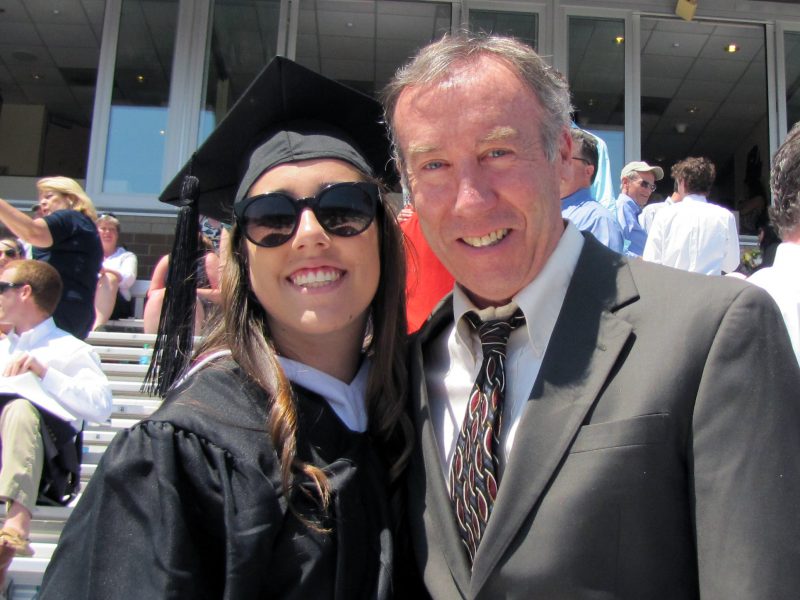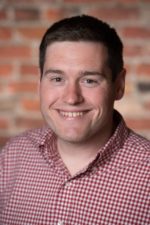
Looking back, Jackie Carney realizes that the signs were always there.
Like when her parents argued more frequently because her father had once again misinterpreted or forgotten his wife’s requests.
Or when she and her sister would tease him for his incorrect answers for basic math problems. This was, after all, a man who started and ran his own successful business for two decades. Surely he could solve simple multiplication problems.
“In a way, it was a relief, because everything made a little more sense,” she said.
“It” was a diagnosis of early onset Alzheimer’s disease. Carney had known of one friend’s family member who had Alzheimer’s, but she was older. Her father was in his 50s. She and her siblings were blindsided and didn’t know what to expect, besides the inevitable memory loss.
“When I heard the word Alzheimer’s, my immediate connotation was that he’s going to forget things, and that would be the extent of it,” she said. “I thought maybe he would simply forget who we were, forget how to get around the neighborhood, forget how to make coffee.
“I didn’t think it would be so all-encompassing.”
Most surprising, she said, was the disease’s impact on conversations with her father. She and her two younger siblings learned to shorten their sentences and to ask just yes/no questions.
“It was way more debilitating than I think that I expected in terms of it affected the way he expressed himself, it affected the way he understood conversation,” she said.
Her father’s early retirement forced the family to quickly reevaluate their finances, and Carney begrudgingly agreed to finish her college career a year early to save a year of tuition. She admits that she took an unfair attitude early, failing to appreciate the burden placed on her mother, her sister (who had also enrolled into a three-year undergraduate program closer to home), and her brother (a high school student who faced his father’s decline daily). Now she says she’s “really very lucky” to have family members who shoulder a hefty load.
Taking a cue from her father, a life-long optimist, Carney finds a silver lining in his still-positive attitude.
“He isn’t able to express things in the same way that he used to be able to, but his overall aura is the same, which is really great.”
Before graduating from Boston College in the spring, Carney penned a column titled “On Optimism” about her experience for The Gavel, a student-run publication at which she had been the opinions editor. It is republished with permission below.
On Optimism
By Jackie Carney, Class of 2016
I like to think of myself as a glass-half-full kind of girl. I handle my failures and disappointments with the catchy and vague expression “everything happens for a reason” and tend to focus on best-case scenarios rather than possible negative outcomes.
Despite the occasional foray into naiveté, like believing in Santa Claus way past the appropriate age, I’ve stuck with the power of positive thinking for the better part of my 21 years. Optimism certainly gets less trendy with age, and many of my more realistically-minded friends don’t understand why I would blindly place my trust in a world that is chaotic and messy. Truth be told, sometimes neither do I.
One of those times was on Christmas Eve morning of my freshman year at BC. My parents called my two younger siblings and me to the kitchen table for breakfast together as family. “There’s something we have to tell you,” my mom started. “Your dad’s been diagnosed with Early Onset Alzheimer’s Disease.”
I sat in stunned silence as my parents explained what this meant in digestible terms. My dad was stepping down as CEO of the mediation and arbitration firm that he had built and run for 20 years. My mom was giving up her university teaching position to take his place at the company. Other than that, life would proceed as normal. Except for the tiny, almost imperceptible fact that my dad’s brain was deteriorating at an unpredictable and unstoppable pace.
A few days later, my mom approached me and asked me to consider opting to graduate from BC in three years, a choice that had been made possible by my AP course load in high school. She explained that no one knew what form my dad’s illness would take in the years to come, and that treatment would be expensive. I protested immediately.
It was unfair that I was being punished for doing well in high school. It was unfair that BC was so expensive. It was unfair that, as the oldest child, I had to make the sacrifice. It was unfair that my dad, a two-time marathon runner and successful businessman, was losing his mind. Unfair, unfair, unfair.
It was in the months following my dad’s diagnosis that I began to realize that optimism has its limits. It’s pretty hard to be optimistic about a debilitating and incurable cognitive disease, especially when even highly trained neurologists can’t tell you what caused it or if it’s genetic. If everything happens for a reason, what’s the reason for Early Onset Alzheimer’s, and why my family?
At BC, I was insulated from developments at home. Other than my closest friends, no one knew about my dad. People accepted that I was graduating early to save money, but more often than not, they didn’t quite get it. “Why would you do that to yourself?,” I was often asked. “Do you hate fun?”
At the same time, it was also at BC that I started to trust in the world again. I found family in the seven girls of Vandy 311, purpose in my 4Boston placement, independence in Dublin, and freedom to express myself in The Gavel. My life was no longer about what I couldn’t do—I couldn’t go abroad for a full semester, I couldn’t live in the Mods, I couldn’t help my dad—but what I could: I could get a job, I could show gratitude to the people I love, I could deepen my relationship with my family. Come my last year, I realized that, although I wanted more time at BC, I didn’t need it.
Ultimately, it is my dad who stands as the prime example of why I choose optimism. In the years since his diagnosis, he has only become goofier, more loving, and more positive. My family has grown closer, bound tightly together by an experience that is wholly our own. In action more than in speech, my dad has taught me that the most important things in life are the little victories, not the big tragedies. He has also taught me that life doesn’t have to be fair to be good.
Since September of this year, my dad’s mental state has taken a sharp decline. When we talk on the phone, he often asks me how my family is doing, seemingly unable to discern that the voice on the other end of the line is his daughter’s. He struggles to express his thoughts coherently and has forgotten how to do some of his favorite activities, like playing football in the backyard and making a great cup of coffee. My 21st birthday came and went without him knowing the difference.
But there are good moments too, moments of real clarity and insight where I catch glimpses of my dad as he was before he got sick. Moments when the crushing weight of things I can’t change feels just a little bit lighter. Moments that make me catch my breath because, against all odds, they have me convinced that if I just keep putting my trust in the universe and in the people around me, everything will turn out okay.

